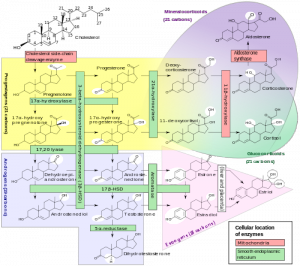[Update 10/8/2013 – at the bottom…]
My first post about birth control focused on cost — why the pharmaceutical industry’s contraceptive pills tend to be expensive. I’ve since realized that staying baby-free is much more important to women than the money spent on pills, no matter the cost. Given the choice between spending lots of money and likely becoming pregnant, women will spend the money, if they have it.
Every woman has a unique response to the pharmaceutical industry’s various birth control products. Some women can tolerate the $9/month generic. Others find they do better with the patent-protected pills that cost $100/month. Still others find that all “hormonal” birth control products are completely intolerable.
Birth control’s side effects are accepted as another cost to bear. The most ironic side effect is decreased libido. Many women find that the “hormones” they take so they can enjoy sex cause them to lose interest.
This is reflective of the industry’s chemical birth control products’ most fundamental problem: so-called “hormonal” birth control products don’t actually contain human hormones.
While the pills, implants and injections do a good job of suppressing ovulation and preventing pregnancy, all the side effects that women experience are caused by replacing Nature’s hormone with man-made chemical imposters.
Nature periodically suppresses ovulation so that all embryos in a woman’s uterus start their development at the same time. As was covered last time, the human hormone progesterone temporarily stops development of the ovaries’ follicles during the luteal phase of the menstrual cycle, and for the duration of a pregnancy.
Progesterone was evaluated in the 1950s for use as a birth control. But the progesterone pills they tried didn’t suppress ovulation well enough, and investigation shifted to other chemicals with effects sort of similar to genuine progesterone.
These other chemicals do effectively suppress ovulation, but they also wreak havoc in the body’s delicate hormone machinery.
Progesterone is one of the body’s most basic steroid hormones. Many people think progesterone is only important for women who are trying to conceive due to the misleading name (“pro-gestational hormone”), but this is certainly NOT the case.
In both men and women, progesterone has functions related to the efficient use of oxygen and glucose, and removing accumulated estrogen from cells. It is also converted into testosterone, estrogen, the regulatory hormone aldosterone, and the stress hormone cortisol.
Aldosterone works to help the kidneys conserve sodium. Cortisol “is released in response to stress and a low level of blood glucocorticoids. [Cortisol’s] primary functions are to increase blood sugar, suppress the immune system, and aid in fat, protein and carbohydrate metabolism.”
This diagram clearly shows that progesterone is at the center of humans’ steroid hormone system:

- “Steroidogenesis is the biological process by which steroids are generated from cholesterol and transformed into other steroids. The pathways of steroidogenesis differ between different species, but the pathways of human steroidogenesis are shown in the figure.” (click through to wikipedia for the full-size version)
While the “progestins” in birth control are similar enough to human progesterone to trick ovaries into stopping work on follicles, they CANNOT be converted to other steroids.
Furthermore, “fake progesterone” in birth control tricks the body into thinking there is plenty in circulation: “WE’VE GOT ENOUGH PROGESTERONE ALREADY, NO NEED TO MAKE ANY MORE!”
The Libido Problem
Male testicles create large amounts of testosterone. This is the hormone responsible for men’s increased muscle mass as compared to women. In women, small amounts of the same hormone is responsible for libido.
Sometimes women’s lack of sexual desire is caused by low testosterone levels. Chemical birth control’s interference with the progesterone system makes it much more difficult for a woman’s body to make testosterone. Faced with a severe deficiency, the body wisely conserves what little progesterone it has left to make Cortisol and Aldosterone. Survival is always more important than sex.
Women who experience increased libido on their birth control product likely have excessive levels of testosterone, possibly generated through the DHEA pathway. But without the protective influence of the elevated progesterone levels that follow ovulation, women on chemical birth control products are vulnerable to the androgenic hormones’ (testosterone’s) slow and subtle masculinizing effects.
If there is any doubt as to the libido-killing trait of chemical birth control products, consider that Depo-Provera is also used to “chemically castrate” male sex offenders.
Provera’s effectiveness at suppressing testosterone in men is well documented. This imposter hormone perfectly imitates human progesterone, and sticks to our progesterone receptors like superglue. It doesn’t care about gender.
By replacing progesterone with impostors, the pharmaceutical industry’s birth control products cause a hormonal catastrophe in the human body. While some women think they do not experience undesirable side effects, no body is fully immune to the long-term negative consequences of replacing genuine progesterone with fake hormones.
A future post will specifically address why using the pharmaceutical industry’s birth control pills to manage menstrual problems is “a crime against science”. I’ll also cover some prospects for safe forms of contraception, why family planning is an important adaptation to the modern world, and the medical foolishness that makes pregnancy “more dangerous than [chemical] birth control”. Put your email in the ‘feedburner’ box at the top-right to receive notification about these future posts.
🙂
[Update 10/8/2013 – I have been thinking about these issues for the past year-and-a-half… and have realized that the issues discussed here are more directly applicable to “How Birth Control Causes Weight Gain” than libido loss… Progesterone both helps the body use sugar efficiently, and is also a pro-hormone for cortisol. The stress hormone Cortisol is released to keep blood sugar levels up. By replacing the Glucocorticoid precursor Progesterone with man-made drugs (hormone-analogues), which cannot be converted into glucocorticoids, birth control makes it much more difficult for the body to regulate its blood sugar levels.
Libido is most directly removed by birth control through an increase in the sex hormone binding globulin, which removes both birth control’s hormone-analogues and testosterone from circulation…]